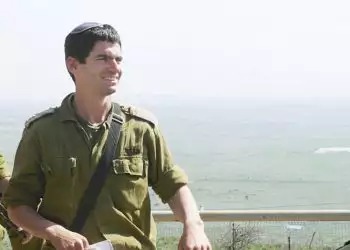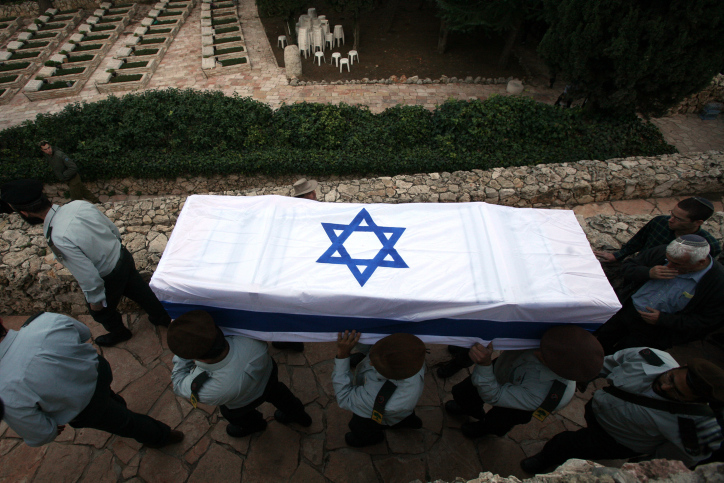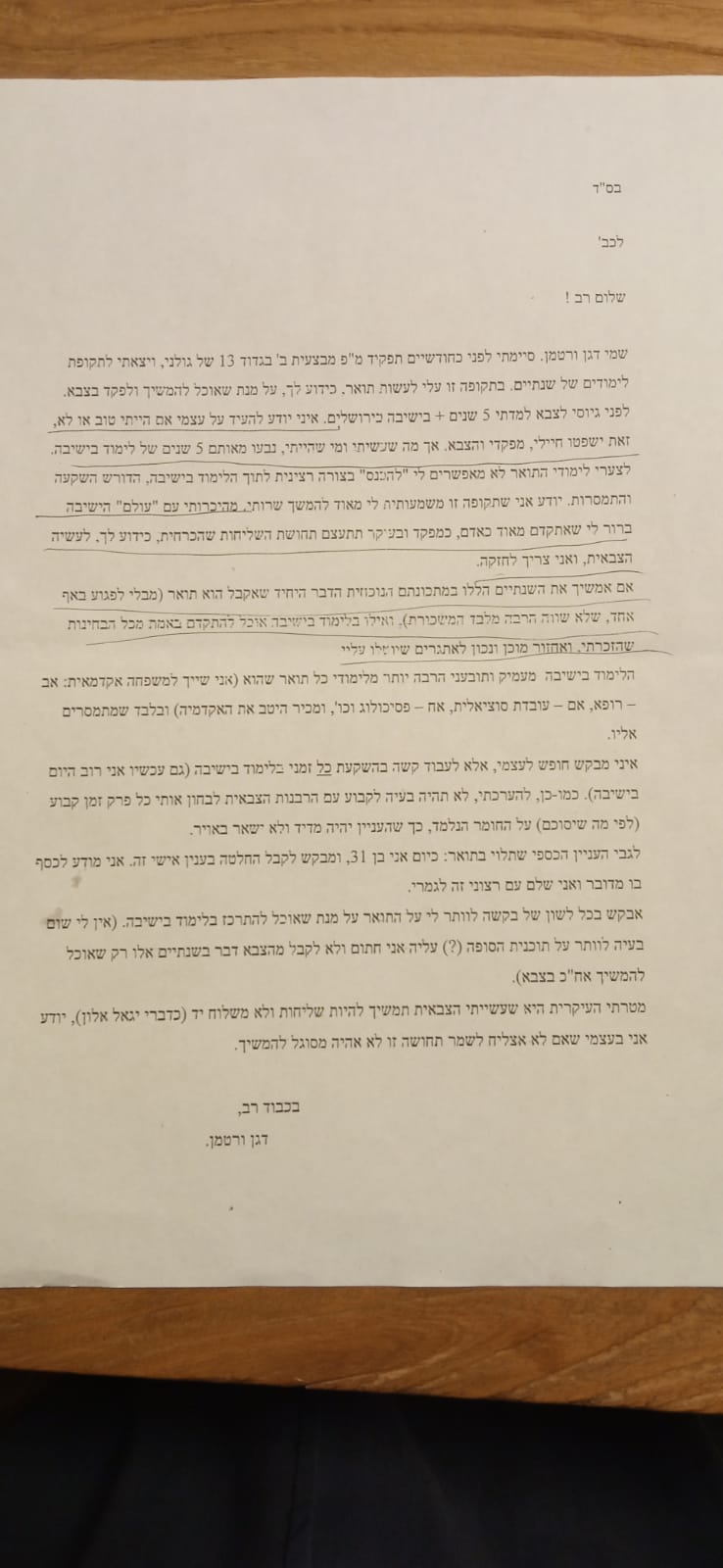"After Dagan's Fall, We Went to His Room and Were Amazed by a Letter on His Desk"
Thirteen years after Dagan Vartman's fall during Operation 'Cast Lead', his sister recounts a man who reached senior positions in the army but claimed that his strength was "only from the Torah." "After his passing, we didn't know how to commemorate him, and then he appeared to me in a dream..."
 (In the circle: Dagan Vartman)
(In the circle: Dagan Vartman)"For 13 years now, I've been giving talks about my brother - Dagan Vartman of blessed memory," says Tema Bar Natan, one of the renowned speakers at 'Gefen' Seminary in Tel Aviv, for strengthening women. "In my daily life, I usually know exactly what my lectures will cover since it's my field of work, but when I come to talk about Dagan, I feel something stops me. I don't really know how to speak or what to say."
"Even now, I'm very hesitant," she adds candidly, "there's so much to tell about him, and it's simply impossible. The truth is, after years of much contemplation and hesitation on the subject, I began to consciously understand that discussing Dagan is beyond me by several measures. Once I realized this, something freed up inside me. I tell myself – 'I'll approach the subject from my humble perspective, I'll try to connect people to something that is on one hand very close, and on the other hand very big, secret, and so vague, and Hashem will help me.'"
"Let Me Learn"
Tema ponders for a moment and then decides to start with a simple story. A story about the letter found in Dagan's room after he fell in Gaza. The letter, which to this day is unknown to whom it was addressed, as it was not mentioned at the top, expressed Dagan's request to use the two years granted to him as a break from the army to earn a degree, and instead of getting a degree, to return to studying in a yeshiva.
And this is what he wrote:
"To...
Greetings,
My name is Dagan Vartman
Before enlisting in the army, I studied for more than five years in a yeshiva in Jerusalem. I cannot testify about myself if I was good or not; my soldiers, commanders, and the army should judge that, but what I did and who I was came from those 5 years of study in the yeshiva.
Unfortunately, my degree studies do not allow me to "enter" seriously into the yeshiva study, which requires investment and dedication. I know that this period is very important for me to continue my service... if I continue these two years in their current format, the only thing I will receive is a degree, whereas in yeshiva study, I can truly advance in all the mentioned aspects."
He then adds: "Yeshiva study is deep and demanding, much more than any university degree (I belong to an academic family: a father who is a doctor, a mother who is a social worker, a brother who is a psychologist, etc., and I know the academia well) provided you are dedicated to it. I ask in all sincerity to waive the degree so that I can focus on yeshiva study."
In his letter, Dagan stresses: "I have no problem not receiving anything from the army during these two years. My main goal is for my military actions to remain a mission and not a profession. I know myself that if I can't preserve this feeling, I won't be able to continue."
Tema finishes the quote and falls silent, giving me a moment to digest the words. "That was Dagan," she finally says, "he was an excellent athlete and could have had a great future in basketball; in the army, too, he advanced to senior positions, until his last role as a company commander of the veteran company of Battalion 13. But as he always emphasized and told us – everything came only thanks to the Torah, since before the army, he studied in yeshiva for about six years, and as you can see – he wanted to study more and more."

Searching for Meaning
Dagan fell about 13 years ago on a very symbolic day – the tenth of Tevet, 5769, in the Jabaliya refugee camp in the Gaza Strip, after an IDF tank inadvertently fired a shell at a house where Golani soldiers were staying.
 (Photo: Yossi Zamir / Flash90)
(Photo: Yossi Zamir / Flash90)"We always knew he was a very special personality," notes his sister, "but the stories we heard afterward during the shiva were nothing short of amazing. Dagan was a humble and modest person, he never shared his achievements with us, nor the fact that he was selected as the Chief of Staff's Outstanding Soldier. Now and then, when we heard and said something to him, he felt uncomfortable, as if we were embarrassing him. Once Dagan told my brother Maayan, in a conversation typical of teenagers: 'I want to live the essence all the time.' That was his language, and his soul aspired to it."
"As I mentioned, Dagan was good in many fields, he was also a great leader. As his soldiers told us, there was a place in Gaza called 'the sniper battery', where sniper fire regularly occurred, and Dagan was asked to secure the area for an hour. He asked his soldiers to join him, and suddenly realized they were afraid to approach because of the shooting. Dagan simply decided to set an example – he got up and walked steadfastly to that battery, not even running. It was clear he was sending a message to all the snipers observing him – the people of Israel do not bend and do not walk with hunched shoulders."
"This didn't come from recklessness but from a great belief in the strength of the people of Israel. Dagan also understood that this was passing a message to his soldiers and commanders. When the soldiers asked him many times why he wasn't afraid, he explained to them: 'When you are connected to something so great, like the eternity of Israel, you have no fear. Because you know all the time that you are part of something eternal, beyond anything temporary, and that is where you live from.'
"By the way, when Dagan was studying in yeshiva, my father received a phone call one day informing him that Dagan was in the emergency room. It turned out he had to be hospitalized, as he developed an inflammation in his elbow from sitting and studying Torah without moving. His yeshiva friends told us that he didn't leave the study hall for entire periods, and they would sometimes bring food to him. He was the one who turned on the lights in the study hall in the morning and turned them off at night. He always explained to his soldiers that all his might in the army was only thanks to the strength of the Torah, and once when a soldier remarked to him: 'You look tired,' Dagan replied in all seriousness: 'Apparently, I didn't study enough Torah.' In another instance, during the Second Lebanon War, he arrived with soldiers to secure a house; they divided up time so they could sleep in shifts, and when it was his turn to sleep, the soldiers found him sitting and studying. They claimed: 'You have to sleep, otherwise where will you get the strength?' but Dagan responded: 'This is my strength.'"
The Company Fund = Dagan's Visa
"There were many more moving details that became known only after his passing," adds Tema, "For example, a clerk at the bank branch where Dagan had an account told us that one day Dagan came and asked him to transfer 10,000 shekels from his personal account to a certain person's account. Later, he came to request another transfer, and so on. It turned out over time that Dagan was depositing sums of money from his account, as an officer, into the accounts of soldiers he knew were in dire straits at home. Soldiers later told us in tears that they knew they were being helped by 'the company fund,' but they never knew that this fund was Dagan's personal visa...
"In general, he had incredible kindness, and we understood from the soldiers that they were always hesitant to join him leaving the base on Thursdays since he would pick up hitchhikers and take them all over the country. 'You could be looking for a ride to Jerusalem and find yourself in Haifa or Hadera,' they said.
"And as I already said, despite all the immense powers he had and the high levels he reached, Dagan was a modest and very unobtrusive person. He used to tell us: 'Forget the excellence certificates; that's not why I'm here,' and when his subordinate commander came to his tent and saw him several times sleeping on the cold ground, Dagan explained seriously: 'A person doesn't need to be taller than an ant.' He always emphasized to us: 'I'm no more than an ant, it is a messenger in the world, and so am I a messenger, we are all messengers.'"
With Everlasting Love, Dagan
"After Dagan was killed," his sister recounts, "we had the feeling that as a family, we were now entrusted with a very significant mission. We knew that although we were silent while he was alive, our role now was to tell everyone who Dagan was, as he wasn't just ours; he brought with him a great and tremendous spirit.
"So we really gathered together and tried to think. Together with my three brothers, I tried to understand how to commemorate Dagan's legacy, we came up with ideas and possibilities, and we all felt we were by no means able to continue his mission, in any form of commemoration. The feeling was terrible – we knew we were the messengers, but we were also the ones preventing the mission.
"In the fifth year after he was killed, my mother told us: 'That's it, let go. We are probably being prevented from above, and we can't do it now.' Our feeling was the same; we felt that a higher power was preventing us, and we indeed let go. But after about two years, something happened that made us return to the subject – it was when Anat Shapira, a family friend, approached us, saying that she wanted to produce a movie about 'Dagan's children' – those children named after our Dagan, as Memorial Day was approaching. At the time, there were about 80 such children, and to our knowledge today, there are at least four times as many. Anat worked on the film, and exactly during that time, I dreamed about Dagan at night, and he told me: 'I don't need anyone to commemorate me.' It really released me because I understood what he was trying to tell us was that he doesn't need to be remembered specifically as a person, but it's important that the spirit of the matters passes on. This is our task."
 The letter found in his room after his passing
The letter found in his room after his passingOn the same day, Tema got up and announced to her parents and family: "I am ready to leave my job and write the book." She approached the task with great fear and apprehension. "In addition to the fear that I won't succeed in conveying the messages, I also felt that technically I didn't have the tools, as I am not a writer and have never been engaged in writing. But the entire family supported me greatly and also advised me a lot. In the end, I decided to bring Dagan's story within a framing story about a couple waiting many years for a child, and when the son is born, the father wants to name him after Dagan, but the mother is concerned. Through the course of the story, stories about Dagan and fascinating depth points about him are revealed. I finished writing the book after about two years of continuous work, and it is now sold in stores, and I receive endless messages and feedback from those who have read it."
Do you feel you have commemorated him in the best possible way?
"No," she answers directly. "I can say that I devoted myself to it as best as I could, but it's not that I succeeded in conveying who Dagan truly was. Dagan remains something obscure and mysterious, far beyond what I can even describe. By the way, we named the book 'With Everlasting Love, Dagan,' as these were the words with which he would sign the letters he wrote to his soldiers. He himself chose the name for his book."
And what is the main thing you take from Dagan into your life?
"It's not one thing, but a combination of things – the belief that what drives the world is the power of love, and love is a derivative of faith. It's also the belief that a great, beautiful, and sweet future awaits the people of Israel, and that a life of meaning is the most important thing in the world."

